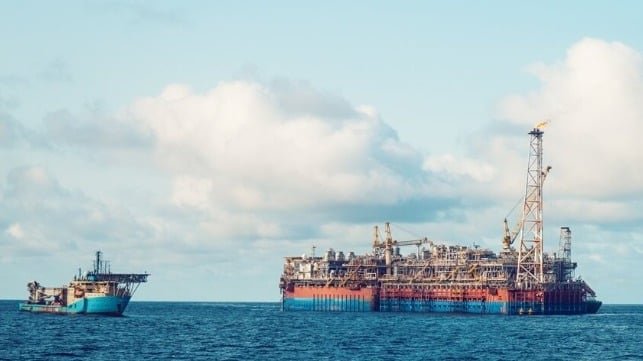 Offshore exploration and production is rebounding in 2025, driven by a dynamic mix of regulatory developments and technological advancements. With the world’s energy demand rising, the industry is accelerating innovations that support the energy transition — with digital and energy-efficiency solutions underpinning future success.
Offshore exploration and production is rebounding in 2025, driven by a dynamic mix of regulatory developments and technological advancements. With the world’s energy demand rising, the industry is accelerating innovations that support the energy transition — with digital and energy-efficiency solutions underpinning future success.
To confirm that technical standards are upheld amid rapid transformation, classification is an independent, objective process used to verify industry best practices, and for more than 70 years.
ABS has served as foundational support for operational safety, environmental protection and the responsible integration of new technologies with offshore rules. Beyond this legacy position, class societies continue to have a vital role in helping offshore asset owners and operators overcome the challenges of ocean depth and harsh environments, keeping safety at the forefront.
As the global offshore sector shifts from recovery to renewed discovery in 2025, ABS is reinforcing the importance of technical safety standards while promoting novel concepts that push the boundaries of what’s possible offshore.
Surging Ahead in South America
South America has emerged as a powerhouse in offshore oil and gas activity, with Brazil and Guyana leading the charge. Brazilian state-owned oil and gas producer Petrobras is investing heavily over the next five years in ambitious initiatives to further explore the Equatorial Margin of northern Brazil where it has drilled 700 wells to date[1]. Its strategic plan for 2025-2029 identifies this region as its most promising new frontier, where it will focus efforts on enhancing production efficiency and field life extension.
Brazil’s offshore industry is at a pivotal moment, where operational efficiency, digital innovation, and regulatory compliance must integrate seamlessly to support sustainable growth. Its FPSO market remains a stabilizing force, with orders for two new units for the Sergipe Deep Waters Project (SEAP), SEAP 1 and SEAP 2, reflecting the strategic importance of these capital-intensive assets.
In a landmark development for Brazil’s offshore digital transformation, an innovative digital twin and condition monitoring project for a mature FPSO in the Cessão Onerosa oil field is underway. This pioneering initiative, aimed at enhancing operational efficiency and safety while effectively extending asset life, involves testing a comprehensive digital twin solution for one of four FPSOs in the Petrobras operated ultra-deepwater, pre-salt field. The project combines real-time monitoring capabilities with predictive analytics to optimize maintenance scheduling, minimize downtime and extend asset life cycles. Creating a digital twin of an asset using advanced structural performance management software can help to enable the industry to transition from traditional time-based maintenance approaches to more efficient condition-based methodologies, resulting in substantial operational cost savings while enhancing safety performance.
The digital transformation of Petrobras’s FPSO fleet exemplifies how leading operators are leveraging cutting-edge technology to maintain a competitive edge in an evolving market. This project underscores the importance of applying digital solutions to complex offshore challenges, particularly in the technologically demanding pre-salt developments that characterize Brazil’s offshore landscape.
Recognized as the class-of-choice for FPSOs in South America, ABS plays a crucial role in working with regulatory agencies such as the Brazilian Navy to help ensure navigation safety and environmental preservation. By fostering problem-solving and knowledge-sharing, class societies are driving industry-wide conversations about the future of offshore. A delegation of maritime and offshore energy leaders not only from Brazil but also Argentina, Chile and throughout South America led by ABS came together in March 2025[2] to discuss forward progress in a region heating up with international interest.
Among the region’s key exploration areas, Guyana has emerged as one of the most exciting offshore oil and gas bright spots in recent years with some of the largest oil finds of the past decade. The ABS-classed Liza Unity FPSO operating in the Stabroek Block offshore Guyana, where ExxonMobil has made 12 oil discoveries since 2015, recently made history as the world’s first FPSO to receive the SUSTAIN-2 Notation[3]. This designation marks a significant milestone for demonstrating environmental performance in offshore operations.
Gaining Momentum in North America and MENA Regions
Spurred on by an energy friendly regulatory regime, the Gulf of America is experiencing a revival in exploration activities, with 12 new fields and facilities scheduled to commence production through 2025[4]. The deployment of innovative floating production units (FPUs) underscores the region’s continued significance in the global offshore landscape.
Notable units such as the all-electric ABS classed Anchor FPU for Chevron’s deepwater development highlight the industry’s commitment to reducing emissions and innovating with cutting-edge subsea technologies. The industry-first unit is rated to safely operate at up to 20,000 psi, with reservoir depths reaching 34,000 ft below sea level while maintaining the highest safety and sustainability standards[5].
Investment in LNG infrastructure remains robust on the U.S. Continental Shelf as North America seeks to diversify its energy portfolio with natural gas solutions. According to the EIA, North America’s LNG export capacity is on track to more than double between 2024 and 2028 to an estimated 24.4 billion cubic feet (Bcf) per day, with 10 projects under construction in Canada, Mexico and the U.S.[6] In 2024, two floating LNG (FLNG) units were completed for the Fast Altamira LNG project offshore Mexico’s east coast[7]. Additional funding from the Government of Canada was secured in March 2025[8] for the Cedar LNG Project, which is a joint development between the Haisla Nation and Pembina Pipeline Corporation in Kitimat, British Columbia. The project will be the first Indigenous-owned FLNG facility in Canada. In the U.S., 2025 plans are moving forward to install an FLNG complex offshore Louisiana and export domestically produced LNG from a proposed deepwater port export terminal project[9].
Meanwhile, the Middle East and North Africa (MENA) region is also demonstrating strong growth in offshore activity. Middle East operators are focusing on optimizing production and expanding subsea engineering, procurement, construction and Installation (EPCI) projects, such as in Qatar’s North Field which is bringing on additional LNG capacity. According to QatarEnergy, recent studies show its legacy field contains additional gas reserves estimated at 240 tcf, bringing Qatar’s gas reserves to more than 2,000 tcf.
In West Africa, ExxonMobil and TotalEnergies are spearheading major offshore projects that further strengthen the region’s importance in the global offshore ecosystem.
FPSOs operating off the coast of Nigeria, specifically in the Egina and Akpo fields, are setting new standards for operational efficiency and environmental performance in challenging deepwater environments. These units have been at the forefront of innovation, paving the way for the future of offshore energy production.
Hanwha Ocean recently received Approval in Principle (AIP) for its Pre-FEED Standard FPSO Design, signaling a new era of asset optimization for deployment in the deep waters of West Africa. This design incorporates cutting-edge technologies such as zero-flaring, GHG monitoring, and an energy management system to ensure minimal environmental impact. By electrifying all equipment, operational costs are reduced, and the vessel’s lifecycle is extended. Additionally, advanced digital solutions like cybersecurity, digital twin, and predictive maintenance have been integrated into the design, further enhancing operational efficiency.
In the realm of classification, AIP plays a crucial role in validating novel concepts and technologies, ensuring the highest safety standards are met before implementation. This certification underscores the importance of innovation in driving the offshore industry forward.
Moreover, the development of an ammonia FPSO unit with carbon capture capabilities by MODEC and Toyo Engineering Corporation represents a significant step towards reducing emissions in offshore operations. This innovative design features an onboard plant that produces low-carbon ammonia while capturing CO? emissions for storage or repurposing. By embracing environmentally friendly technologies, this FPSO concept exemplifies the industry’s commitment to sustainability and emissions reduction.
As the offshore wind industry gains momentum globally, major energy companies are leveraging their deepwater expertise to overcome challenges in floating offshore wind installations. Class societies are playing a crucial role in developing specialized guidance for floating wind structures, drawing upon their experience with floating production systems. This cross-sector collaboration is leading to the development of hybrid energy systems that combine traditional production platforms with floating wind installations, further reducing operational emissions and enhancing field economics.
Looking ahead, the offshore energy sector is poised for continued transformation, with a focus on digitalization, sustainability, and efficiency. As the industry evolves, ABS remains a trusted partner for offshore operators, providing guidance, verification, and expertise to navigate this exciting new chapter in offshore energy development.
In conclusion, the future of offshore energy is bright, with opportunities to advance the world’s energy mix and implement new efficiency technologies. By staying ahead of the curve and embracing innovation, the industry is well-positioned to meet the challenges of tomorrow while driving sustainable growth and operational excellence. the title: “The Benefits of Mindful Meditation for Mental Health”
In today’s fast-paced and stressful world, it’s more important than ever to take care of our mental health. One powerful tool that has been gaining popularity in recent years is mindful meditation. This practice involves focusing on the present moment and bringing awareness to our thoughts and feelings without judgment.
Research has shown that mindful meditation can have a number of benefits for mental health. One of the key benefits is its ability to reduce stress and anxiety. By practicing mindfulness, we can learn to quiet the mind and let go of worries and negative thoughts. This can help us to feel more calm and centered, even in the midst of a hectic day.
Mindful meditation has also been shown to improve mood and increase feelings of happiness. By cultivating a sense of gratitude and appreciation for the present moment, we can learn to find joy in the simple things in life. This can help us to feel more content and fulfilled, even when faced with challenges.
Additionally, mindful meditation can help to improve focus and concentration. By training our minds to stay present and focused on the task at hand, we can become more efficient and productive in our daily lives. This can be especially helpful for those who struggle with distractibility or have difficulty staying on task.
Overall, the benefits of mindful meditation for mental health are numerous. By incorporating this practice into our daily routine, we can experience greater peace, happiness, and overall well-being. So why not give it a try and see the positive impact it can have on your mental health?

